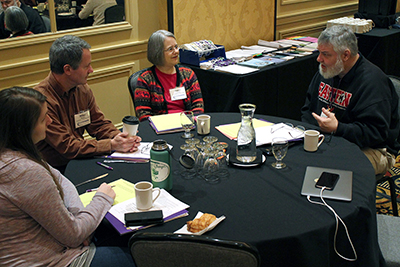CBI Agenda

Monday, December 5
7:00 – 9:00 pm
Networking Reception
Tuesday, December 6
8:00 – 9:00 am
Breakfast and Networking
9:00 – 9:30 am
Welcome and Introductions
Richard Ladner, Sheryl Burgstahler, Amy J. Ko, and Jacob Wobbrock, University of Washington
9:30 – 9:45 am
Video – Leading the Way: Computing Students and Professionals with Disabilities
9:45 – 10:20 am
People with Disabilities in Computing
Richard Ladner
10:20 – 11 am
Accommodations and Universal Design
Sheryl Burgstahler
11:15 – 12:15 pm
Panel of Computing Students with Disabilities
Panelists: Cameron Cassidy, Vincent Martin, Jessie Zhang, and Anna Marie Golden
Moderator: Brianna Blaser, UW
12:15 – 1:00 pm
Discussion During Lunch
At your table, share your institutions’ challenges in increasing the participation of students with disabilities in computing.
1:15 – 1:45 pm
Report Out
1:45 – 3:15 pm
Short Presentations – Teaching about Accessibility
Teach Access
Matt May, Adobe
“The Accessibility Lecture”: Should We Teach Accessibility as a Standalone Topic or Integrate Disability Throughout the Course?
Shiri Azenkot, Cornell University
How Designing for Users With and Without Disabilities Shapes Student Design Thinking
Kristen Shinohara, UW
UW Accessibility Capstone Course
Anat Caspi, UW
Improving a Web Accessibility Class Curriculum
Anna Marie Golden, UW
3:35 – 4:45 pm
Presentation and Discussion: How can we include topics of accessibility in the computing curriculum?
Amy J. Ko, UW
4:45 – 5:00 pm
Preview of Dinner Tonight and Tomorrow’s Topics
Complete Daily Feedback Form
Pose for Group Picture
6:00 – 7:30 pm
Dinner
Discussion: What can be done to make computing classes and departments more accessible to students with disabilities?
Wednesday, December 7
8:00 – 9:00 am
Breakfast and Networking
9:00 – 9:15 am
Daily Overview
9:15 – 10:00 am
Discussion in Small Groups to Develop Solutions
Considering the barriers that were discussed yesterday over lunch and dinner, identify concrete, actionable solutions that institutions might implement to overcome these barriers. Develop prototypes of these solutions.
10:00 – 10:30 am
Report Out
Share the solutions that you developed this morning. How can these plans be further developed? How can we encourage institutions to adopt these sorts of plans?
10:45 – 12 pm
Short Presentations – Working with Students with Disabilities
Including Students with Disabilities in Summer Programs
Sarah Lee, Mississippi State University
Multi-Modal Lecturing Helps All to Learn
Vincent Martin, Georgia Tech
Teaching Coding to Blind Students
Jose Alvarez, University of Puerto Rico
Accessible Presentations
Kyle Rector, University of Iowa
Runestone Interactive
Jeff Rick, Georgia Tech
12:00 – 1:00 pm
Resource Production & Lunch
Individually or in groups, develop resources related to our discussions. This could include potential promising practices, Q&A’s, or case studies for our knowledge base; a 1 to 2 page handout about teaching accessibility; or modules related to teaching accessibility.
1:00 – 1:30 pm
Report Out
1:30 – 2:45 pm
Continue Development of Resources
2:45 – 3:30 pm
IT Accessibility: What Your Institutions Are Doing, and How You Can Help
Terrill Thompson, UW
3:30 – 4:00 pm
AccessComputing Resources
4:00 – 4:30 pm
Discussion: How can we continue to work together to promote the participation of people with disabilities in computing and the inclusion of information related to disability, accessibility, and universal design in the computing curriculum?
Evaluation